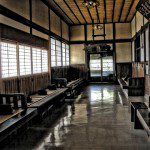 I’m just back from a few days along the North Shore of Lake Superior – a magical time, soaking in the hot tub and gazing out at the lake. These are among my favorite activities on this planet.
I’m just back from a few days along the North Shore of Lake Superior – a magical time, soaking in the hot tub and gazing out at the lake. These are among my favorite activities on this planet.
Zen teaching and practice, as you may know, embrace the ordinary as extraordinary. For example, a monk once asked great master Baizhang, “What is the most extraordinary thing?”
Baizhang (whose name means “Hero Peak”) said, “Sitting alone on Hero Peak.”
Simple as that.
But what about “real” magic and extraordinary occurrences?
This question doesn’t come up much these days and that’s largely a good thing, imv. When I came to the Minnesota Zen Center in 1977, however, it was a big deal for the practitioners there.
The student who was the ino (temple coordinator) believed that the path of enlightenment involved zazen + THC and so smoked a joint at every break during sesshin. No enlightenment as far as I know.
To me it seemed like spiritual fascination, perhaps a remnant of the post-hippie period. Carlos Castenada books about his supernatural exploits with the native shaman, Don Juan, were hugely popular (turns out that Castenada’s ex-wife says he never left the UCLA library).
Anyway, back in the old days it seemed to me that many of my fellow students were hoping for some supernatural powers from all the zazen we did. I just wanted my knees to hurt less.
Katagiri Roshi was characteristically inconsistent on the point. When asked about supernatural powers, he said on several occasions, “Of course, I have, but, anyway, not so important.”
Maybe he meant the extraordinary ability to be really ordinary, chopping wood and carrying water and all. I can report candidly that I did not witness Roshi performing any miracles.
One student, though, told me about a sort of miracle that he witnessed. Apparently, this fellow (who is now a well-known author) came into the Zen Center and found Roshi downstairs in seiza, calling to a mouse trapped in the corner of the basement to come into a shoe box that Roshi held tipped to the side. My “source” reported that the mouse listened to Roshi’s “Here mousey, mousey…” and dutifully came to the box. Roshi slipped on the cover and took the mouse outside.
The student believed that Roshi really had invented a better mouse trap. But was 30 years of zazen really worth it?
Even at the time, I doubted the veracity of this report, however, because I know that Roshi hid chocolate in his closet and when mice found it, they chewed it all up. This really annoyed Roshi. Where were his supernatural mouse-trap powers then, eh?
Well, most modern people don’t believe in supernatural powers and dharma practitioners generally blow off that kind of talk. This is one of the things that makes us pretty weird because most Buddhist for the last 2,500 years did apparently believe in miracles and it was quite important for a teacher’s career to do a few from time to time. Even the twentieth century Chinese monk, Empty Cloud, is reputed to have performed many extraordinary feats.
The Buddha too seemed to take supernatural powers seriously and some of his disciples, lay and monk, did some wild things like fly around. Buddha even had a list of them. Here’s how it appears in Dogen’s Thirty-Seven Practices of Enlightenment:
The four elements of supernormal powers are: the supernormal power of desire, the supernormal power of the mind, the supernormal power of effort, and the supernormal power of contemplation.
Dogen’s commentary makes them all really normal. For example, Dogen says that the supernormal power of mind is “… brilliant red bamboo or a wooden chair.”
Nevertheless, there were apparently a number of miracles at Eiheiji like the monks hall not smelling badly for a couple months. See Enlightenment Unfolds, p. 261-262 for more on this.
Imv, extraordinary things, even supernatural stuff, are possible and when people sit a lot, that seems to invite that category of happenings. Maybe supernatural events are samadhi off-gasses.
And more importantly – I’m finally getting to the obvious point – after my years of practice, the ordinary is quite extraordinary enough.












